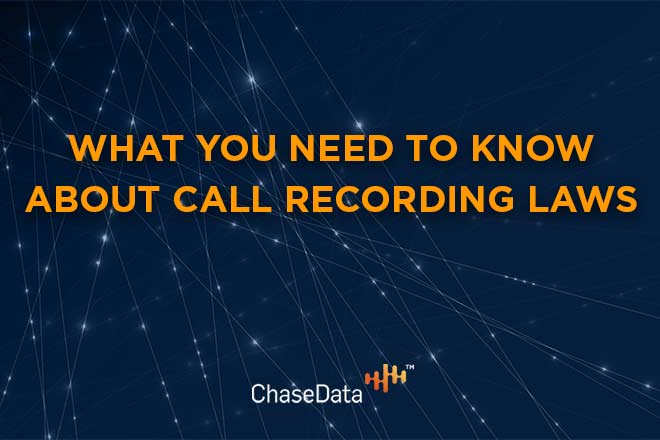March, 12 2020 4:29 pm

Call recording is an ideal solution for contact centers to improve both training approaches and customer satisfaction levels. It can be used to create training materials based on actual calls that have transpired in the center, as well as to train individual agents based on their own unique strengths and weaknesses. It can also help to create goals that can be used to improve overall agent performance and work toward improving the customer experience. These are just some of the reasons call recording is so widely employed in call centers around the world today.
However, there are laws that govern the use of recording technology. Understanding call recording laws and their place in the world of the call center will help you make your facility its best - all while staying well within the law.
There is a lot happening in the world of consumer data and privacy. Don’t believe us? Just take a look at the United States alone, where 2018-early 2020 has seen a dramatic jump in the number of states taking localized action against data piracy and privacy invasion through increasingly-strict laws.
These changes aren’t just impacting the way those individual states do business in terms of calls and consumer privacy. They are creating precedents that will influence the entire industry for years to come. The CCPA - the California Consumer’s Privacy Act - for example, is one of the most meaningful shifts in the tide of allowing consumers to gain access to information that involves them and protecting those same consumers from data being processed in ways they don’t agree to. All of this will have major, lingering impacts on call recording laws far and wide - in 2020 and well beyond.
What can you expect to see in terms of changes to call recording laws and privacy regulations? Experts agree that changes will begin with more access.
Imagine knowing that a business or entity has information about you - but you don’t know what they know, or what information they have. Under the CCPA and many new laws like it, consumers have the legal right to request information that a business has about them. While this may not be available if it also contains sensitive information about another individual, any information held by a company that is solely about the consumer in question is eligible for release to that consumer upon request.
What does that mean? It means that if you’ve recorded a customer’s call, they can request an audio file or transcript of that call for personal use. The format that you present them this information in must be one that they can easily utilize. This no longer has to be court mandated, such as for use in legal proceedings or other court-based use. It can now be requested for personal use of any kind, by any individual.
Information about how data is being used will also be available to consumers upon request. This means that your consumers will have the right to know what you’re doing with their recorded calls and information - such as creating training materials and more - as well as be allowed to know if you are sharing or granting access to any of their information to any third parties for marketing, research, or any other purposes.
These requests will be limited to twice a year per consumer, and will only offer up to twelve months’ review in past data. However, they are still undoubtedly going to make waves in the way we handle and think about consumer data.
Likewise, it is very likely that more litigation will be seen as a result of these laws and changes. The lines between freedom of speech and informational privacy are sure to blur. This may complicate things for both lawyers and their clients who are involved in cases regarding informational privacy, but since none of these laws have officially been passed yet, this has yet to be seen.
With so much legal red tape, you may wonder if it’s still possible - and still worth it - to make use of call recording technology in your facility. The truth is, even with lots of legal boxes to check, this technology is still both useful and important in creating the best possible service for consumers and productivity for agents.
As long as you are staying within the laws that govern your operation, it is perfectly acceptable - and wholly advisable - to analyze recorded calls for training opportunities and to create training materials. Whether this means listening to an agent’s own previously-recorded exchange or using recorded calls during group training events, there is so much to be learned from recorded calls - and all the information is just sitting there if it’s not being used!
The point of call recording laws isn’t to hinder the use that can be made out of information you have access to. It is simply to grant consumers more access to this information themselves and to protect their privacy in a world that increasingly endangers it. Remember this. These laws aren’t your enemy. With a better understanding of them, they can even feel more like an ally, helping you to maintain the quality of your service while also yielding useful material from your previous calls.
Ready to make the best use of call recording in your facility? Talk to the experts at ChaseData. Our experienced team not only understands call recording laws, we design our software solutions around them. Don’t waste time wondering. Equip your team with the tools and technology you need to succeed. Give us a call today to learn more!